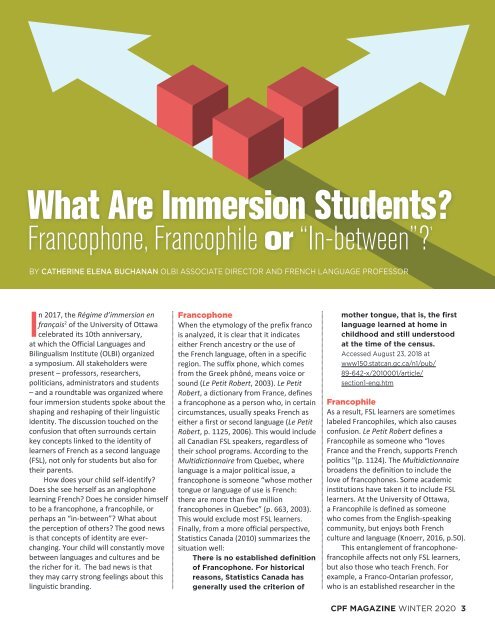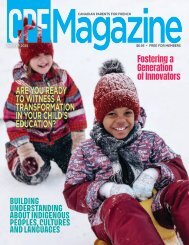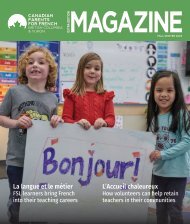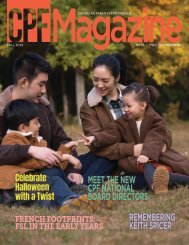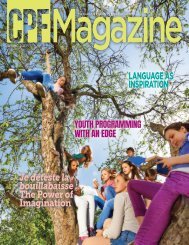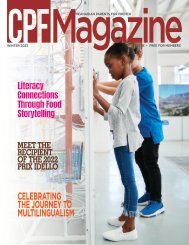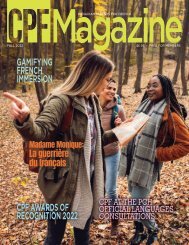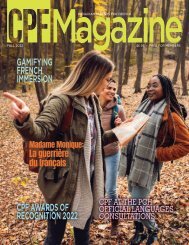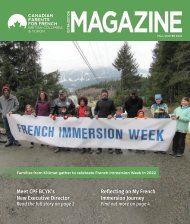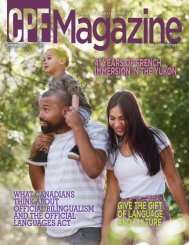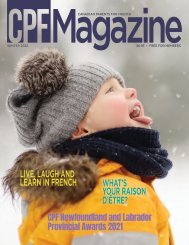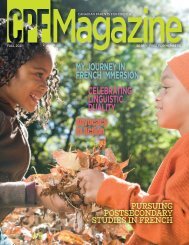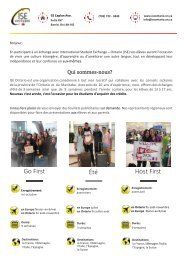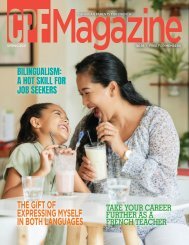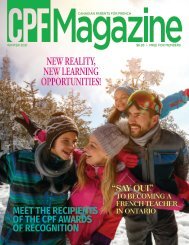CPF Magazine Winter 2020 Issue
A national network of volunteers, parents and stakeholders who value French as an integral part of Canada. CPF Magazine is dedicated to the promotion and creation of French-second-language learning opportunities for young Canadians.
A national network of volunteers, parents and stakeholders who value French as an integral part of Canada. CPF Magazine is dedicated to the promotion and creation of French-second-language learning opportunities for young Canadians.
Create successful ePaper yourself
Turn your PDF publications into a flip-book with our unique Google optimized e-Paper software.
What Are Immersion Students?<br />
Francophone, Francophile or “In-between”?1<br />
BY CATHERINE ELENA BUCHANAN OLBI ASSOCIATE DIRECTOR AND FRENCH LANGUAGE PROFESSOR<br />
In 2017, the Régime d’immersion en<br />
français 2 of the University of Ottawa<br />
celebrated its 10th anniversary,<br />
at which the Official Languages and<br />
Bilingualism Institute (OLBI) organized<br />
a symposium. All stakeholders were<br />
present – professors, researchers,<br />
politicians, administrators and students<br />
– and a roundtable was organized where<br />
four immersion students spoke about the<br />
shaping and reshaping of their linguistic<br />
identity. The discussion touched on the<br />
confusion that often surrounds certain<br />
key concepts linked to the identity of<br />
learners of French as a second language<br />
(FSL), not only for students but also for<br />
their parents.<br />
How does your child self-identify?<br />
Does she see herself as an anglophone<br />
learning French? Does he consider himself<br />
to be a francophone, a francophile, or<br />
perhaps an “in-between”? What about<br />
the perception of others? The good news<br />
is that concepts of identity are everchanging.<br />
Your child will constantly move<br />
between languages and cultures and be<br />
the richer for it. The bad news is that<br />
they may carry strong feelings about this<br />
linguistic branding.<br />
Francophone<br />
When the etymology of the prefix franco<br />
is analyzed, it is clear that it indicates<br />
either French ancestry or the use of<br />
the French language, often in a specific<br />
region. The suffix phone, which comes<br />
from the Greek phôné, means voice or<br />
sound (Le Petit Robert, 2003). Le Petit<br />
Robert, a dictionary from France, defines<br />
a francophone as a person who, in certain<br />
circumstances, usually speaks French as<br />
either a first or second language (Le Petit<br />
Robert, p. 1125, 2006). This would include<br />
all Canadian FSL speakers, regardless of<br />
their school programs. According to the<br />
Multidictionnaire from Quebec, where<br />
language is a major political issue, a<br />
francophone is someone “whose mother<br />
tongue or language of use is French:<br />
there are more than five million<br />
francophones in Quebec” (p. 663, 2003).<br />
This would exclude most FSL learners.<br />
Finally, from a more official perspective,<br />
Statistics Canada (2010) summarizes the<br />
situation well:<br />
There is no established definition<br />
of Francophone. For historical<br />
reasons, Statistics Canada has<br />
generally used the criterion of<br />
mother tongue, that is, the first<br />
language learned at home in<br />
childhood and still understood<br />
at the time of the census.<br />
Accessed August 23, 2018 at<br />
www150.statcan.gc.ca/n1/pub/<br />
89-642-x/2010001/article/<br />
section1-eng.htm<br />
Francophile<br />
As a result, FSL learners are sometimes<br />
labeled Francophiles, which also causes<br />
confusion. Le Petit Robert defines a<br />
Francophile as someone who “loves<br />
France and the French, supports French<br />
politics "(p. 1124). The Multidictionnaire<br />
broadens the definition to include the<br />
love of francophones. Some academic<br />
institutions have taken it to include FSL<br />
learners. At the University of Ottawa,<br />
a Francophile is defined as someone<br />
who comes from the English-speaking<br />
community, but enjoys both French<br />
culture and language (Knoerr, 2016, p.50).<br />
This entanglement of francophonefrancophile<br />
affects not only FSL learners,<br />
but also those who teach French. For<br />
example, a Franco-Ontarian professor,<br />
who is an established researcher in the<br />
<strong>CPF</strong> MAGAZINE WINTER <strong>2020</strong> 3


